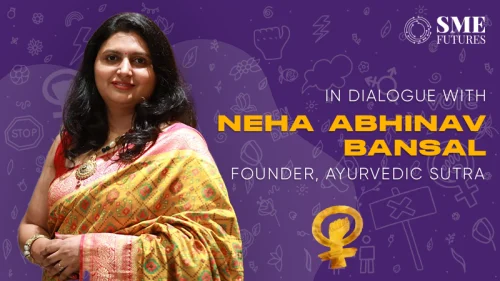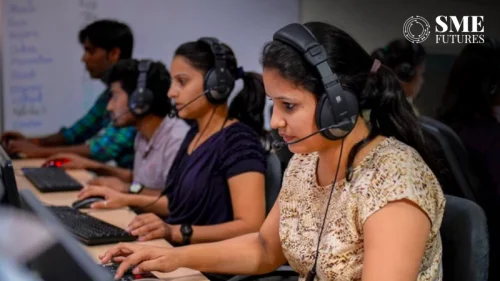Starting a business is not for the faint of heart. Let’s face it…there’s lot of hard work involved in it. It will work for you if you are resilient enough to face rejection and failure!
The good news is that the number of entrepreneurs in India has increased significantly in recent years. Despite the challenges, small business owners are rapidly expanding. Most entrepreneurs, however, will tell you that it is not an easy path. Of course, running a small business is rewarding, but it can also be lonely at times. Because no two businesses are alike, they face their own unique challenges. This is where mentors, accelerators and businesses with a wide range of services come into the scene, to assist these small companies to grow and succeed. This implies that running a small business is also about sharing your experience with others and is hardly ever a one man or one woman show.
We spoke to some of the entrepreneurial minds who have launched their own businesses with the intent to make it big in India Inc. There stories provide insights on how they as an MSME are impacting the lives of others. They also show us how digital transformation has played a key role in their entrepreneurial journeys and how it has helped them to grow their businesses.
A journey from banking to social entrepreneurship
Amit Jain, from the small town of Bhusawal in Maharashtra, arrived in Pune in 2012 with only Rs 1000 in his pocket and high hopes of finding a decent job. He was fortunate to find one in the banking industry with The Bank of New York Mellon. A few years passed, but Jain’s life had other plans. He wanted to give back to society, so he decided to become his own boss.
“I am sure most of you have experienced that strong urge to do something totally new. Some refer to it as following a passion, others see it as stepping out of one’s comfort zone. A few will call it absolute madness. But I simply view it as taking a tiny step towards something that I believed in and it was Mitti Ke Rang (MKR),” says Jain.
Founded in 2014 by Amit Jain and Saket Deshmukh, Mitti Ke Rang is a social venture that helps small women entrepreneurs to get their products online. “It’s a small social venture working towards generating a livelihood for women through an e-commerce platform,” he tells us.
Also Read: Indian EV makers to soon follow BIS standards for batteries amid fires
Jain lost his father at the age of three. His grandfather opened a tailoring shop for his mother, while his cousins supported him. Coming from a humble background, he has seen his mother going through a lot of struggles at home, so making other’s lives easier was his next step.
“Back then, Mitti Ke Rang was nothing. But my co-founder Saket Deshmukh and I wholeheartedly believed that we could do something useful and satisfying. MKR had grown by 2018 and managing a full-time job along with it was more than just demanding,” Jain reminisces.
So, in 2019, Jain left his bank job to give MKR his full time and attention. “At that time, we realised that there were many women in Pune who were looking for opportunities to earn a livelihood. So, we decided to become full-time entrepreneurs and assist these women to become entrepreneurs themselves,” he tells us. At that time, quitting his job was not an option, so he informed his family that the company was letting him go.
During his entrepreneurial journey, the Global Alliance for Mass Entrepreneurship (GAME) assisted him to transform his venture digitally. “It has helped us immensely, as post Covid the world has become increasingly digital. We were able to reach out to thousands of customers. Which in turn helped us to create more sources of livelihood for our women entrepreneurs. In addition, our recent online campaign of Game – 1000 stories has been a great support in terms of enabling us to reach out to more people who wish to support our cause. This has surely helped us to create more awareness about our women entrepreneurs,” he says.

The duo started with an initial investment of Rs 10,000. And, in the last one year, they have generated sales of around Rs 75 lakhs. Moving ahead, his long-term strategy is to onboard more women entrepreneurs from across India and help them to scale their products internationally.
Making a brand name
It’s a fact that more than half of the MSMEs come from the tier 2 and tier 3 cities. These small businesses or start-ups are making a great name for themselves as stand out brands on the back of unique and new products and business models. With a dream of making her own brand name, a small-town girl from Jamshedpur, Apoorva Jalan founded her own home décor and furnishing business during the pandemic.
“I graduated in interior design from Delhi and then relocated to Florence, Italy, to pursue a master’s degree in the same field. Florence is regarded as the birthplace of interior design, and it enchanted me in unexpected ways. I wanted to bring this concept and sense of lifestyle and luxury to India at a reasonable price. This was the germ of the idea that eventually grew into my start-up,” says Jalan.
Also Read: The GST conundrum: A super hard level for the Indian online gaming sector
Speaking to SME Futures about her entrepreneurial journey, Jalan says that initially she thought of working for others and got an offer from the Prestige Group in Bengaluru. But her entrepreneurial mind never fully accepted the idea of working for someone else.
“I have always found myself predisposed to the idea of designing and wanted to grow a career out of the same. But initially, I thought about doing a job to get accustomed to the Indian work life and to learn more about Indian style aesthetics. But I didn’t accept the offer for two reasons. First, I always dreamt of having my own label and second, I was planning my marriage,” she tells us.
She claims that after their marriage, Jalan’s husband pushed her to refocus on doing her own thing and pursue her dream. That’s when she really got serious about her label. “In the middle of 2019, I started my business and built my online website. To curate my collection, we travelled a lot across India, met manufacturers, and built our own vendor circle and supply chain. But due to the pandemic, I had to put my plans on hold. Because due to logistics restrictions, we had to witness some financial loss and product damages,” she reminisces.
In addition to these challenges, Jalan couldn’t afford to let her website go down. So, she chose to look after her website and curated her own content while doing all the photoshoots by herself during the lockdowns. “It was all new for me, but it was an exciting journey. Not knowing how the response would be, I also started doing social commerce on Instagram. But surprisingly, I started getting orders. I also collaborated with a few bloggers to kick off my sales. At the same time, I lost many opportunities due to poor logistics during the lockdowns,” Jalan tells us.
One challenge among the many other challenges that she is facing in this field, is that of stiff competition. However, Jalan’s start-up is totally bootstrapped till now, and her sales during the lockdowns have given her the confidence to move full steam ahead with her venture. “My sales revenues have surged over time, but I have no plans to get outer investors onboard. But I do plan to eventually expand and open a physical brand outlet in Jamshedpur by next year, may be!” she asserts.
While signing off, Jalan says that to be an entrepreneur, we should always be legitimate and genuine with whatever we are trying to pursue because, in the end, that is what matters the most.

Building a brand in a highly competitive arena
An engineering degree in electronics, an MBA degree combined with research work at a reputable institution (CSIR) is a winning combination for a well-paying job. However, Akhilesh Chopra, a second-generation entrepreneur from Delhi, turned down a job offer from a well-known company in 2013 in order to pursue his dream of working on his own terms.
“From childhood, I was always compelled to be right in the middle of things and wanted to know how everything works. Even during my research days, I knew that I did not want to get into a 9 to 5 job and wanted to become an entrepreneur, as a job doesn’t give you the freedom to do things on your own terms. So, in 2013 I joined my family business,” says Chopra, Sales and Technical Director at Bluei, a homegrown mobile accessories brand.
Also Read: Top Indian firms show resilience post-pandemic, Tata Group at top spot
Once there, he put his skills and education to use at various levels—sales and technical, co-designed Bluei and brought it to fruition from the drawing board.
Chopra tells us that their family business began in 1988 in Delhi as an electronics showroom. In 2003, his uncle, Rajesh Chopra (MD of Bluei), ventured into the mobile spare parts and tools business. In 2009, they also added a CCTV segment, which his brother manages now. When he joined in 2013, he began working on expanding and developing their own mobile accessory brand-Bluei.
Today, the Bluei portfolio has over 400 products, more than 200+ distributors and 5000+ dealers pan India.
The entrepreneurial journey can never be an easy feat for anyone, and Chopra has witnessed his fair share of ups and downs.
“There was a price challenge due to our quality and branding. The products were a bit more expensive than the local unbranded ones. Then when you are a new brand, it’s extremely tough to convince people to check you out, to buy from you and to sell your products. People used to ask us, ye kahan ka brand hai? kaisa hai? Hum kyun beche? The other challenges came in the form of us being short of credit, delayed payments and the difficulties that we faced in trust building. But eventually we managed to build a good rapport in the market due to our good quality products and here we are,” Chopra tells us.
He informs us that Bluei products are getting great feedback and referrals, and the company is growing and bringing in good revenues. Chopra also gives a lot of credit to his team and his family members for this success. “We researched about the market trends and what the consumers wanted, came up with the products and I used my technical knowledge to grow this company. A lot of people have helped me in this venture. Be it our team, our distributors and sellers, and most of all my family members—whose business experience came in very handy for us,” he asserts.
The company started with a meagre sum of Rs 20 lakhs. In terms of investments, Bluei is self-dependent and has not received any funding. But that doesn’t mean that the company is not open to VC funding, says Chopra. “If we get a chance to collaborate along with a good investment opportunity, we are very much open to that,” he tells us.
The company has launched its exclusive stores in a few Indian cities in collaboration with their local bodies and their partners. Navigating ahead, Bluei wants to open more such stores down the line. Meanwhile it is working to strengthen its channel partner network and expand its footprint.

Micro businesses, macro dreams
It looks like a typical next-door cosmetic shop in Jhajjar, Haryana. Not on the lines of a start-up or a company with employees. Nisha, the shop owner, however, pulls out her phone to give you a breakdown of your purchases, a digital receipt, and finally accepts your payment via an app. Watching her confidently do all of these things, you get a true picture of what a successful micro entrepreneur looks like.
For supporting her family, she has been running the Kartik & Kirath Cosmetic Store in Chandol village for over three years now. Her husband runs a perfume shop in town, and she takes care of this one.
Also Read: NRAI dismisses reports on govt calling restaurant service charge illegal
The pandemic impelled them to go digital as they realised that they needed to let go of their traditional ways of doing business and move online in order to sustain their micro business.
But living in a small town has its own setbacks and Nisha had to face them too. Talking about her digital journey, she tells us that her biggest challenge was that she was quite apprehensive about using technology to run her business. Her old-school methods of book-keeping were troublesome, and that along with the pandemic compelled her to look for digital solutions to the problems that she was facing in her business. But the next issue that she had to deal with was about whom to trust with this job.
Having no access to computers, an app was the only go-to option for Nisha. Her journey started off rather roughly with some apps seeming too complicated to use. “I tried two-three apps, but Khatabook was the easiest to learn. The things for which I wanted this app from the beginning, I learned all those features very easily. The biggest advantage is that this app is in Hindi,” she tells us.
Having the convenience of conducting online transactions have played a huge role in the growth of her business, she adds. Now she conducts her entire business online—from generating bills for customers to ordering wholesale items from suppliers. “The digital space has been a blessing from me, my revenue has become significantly higher than what it used to be. The icing on top is that since last year, I have started taking online orders and delivering them in the nearby cities,” she says.
She informs us that she now uses the same app to manage her personal finances as well. After seeing how technology is helping her small business, many people in her neighbourhood have become inspired by Nisha.

Small business stories to be continued…
India is the land of small businesses. At the same time, there are millions of untold stories that need to be shared, which we have taken the responsibility to uncover and bring to the forefront. Stories about success, inspiration and challenges that have been faced and overcome. So, subscribe to our newsletter and keep reading SME Futures.











